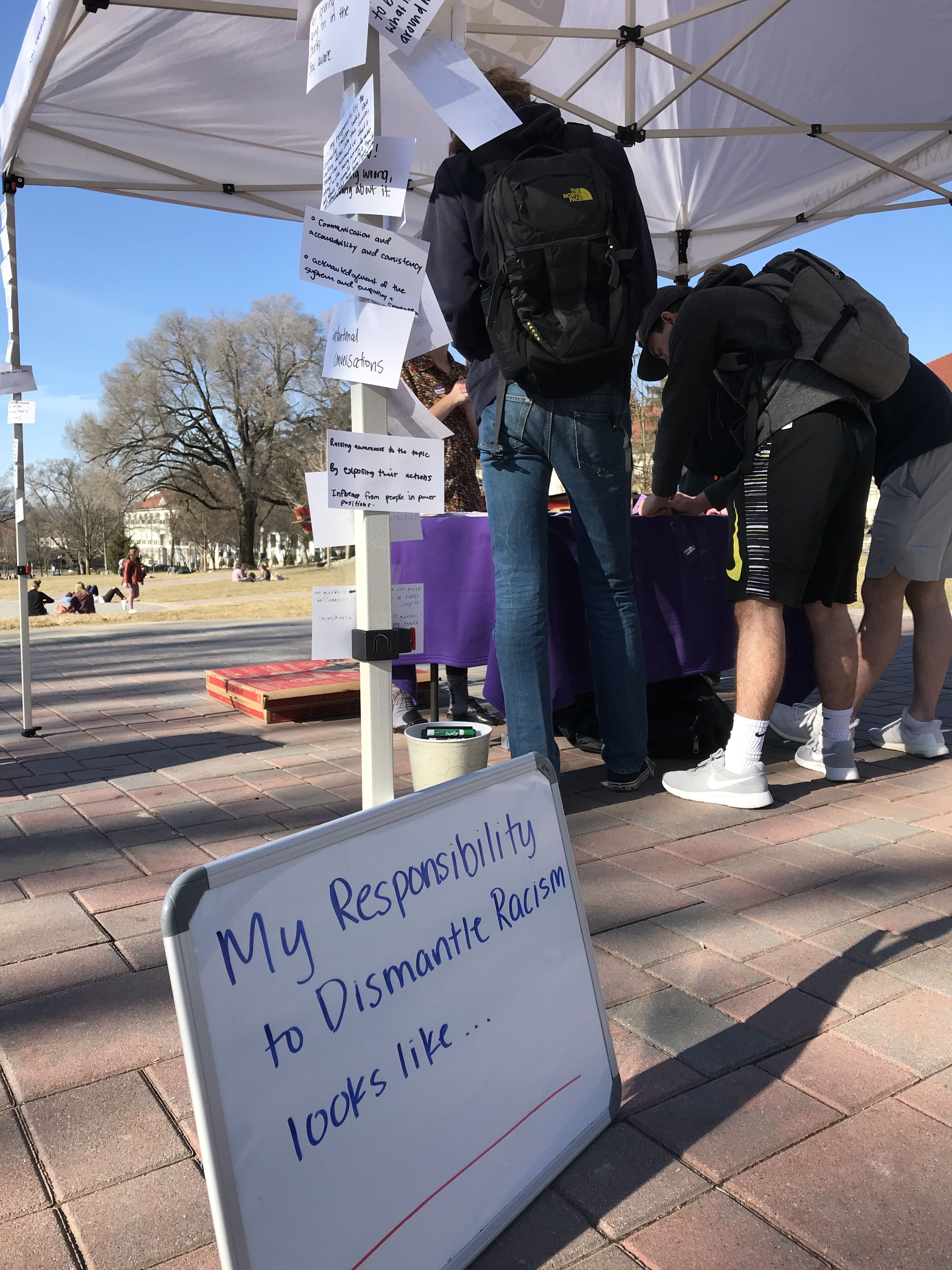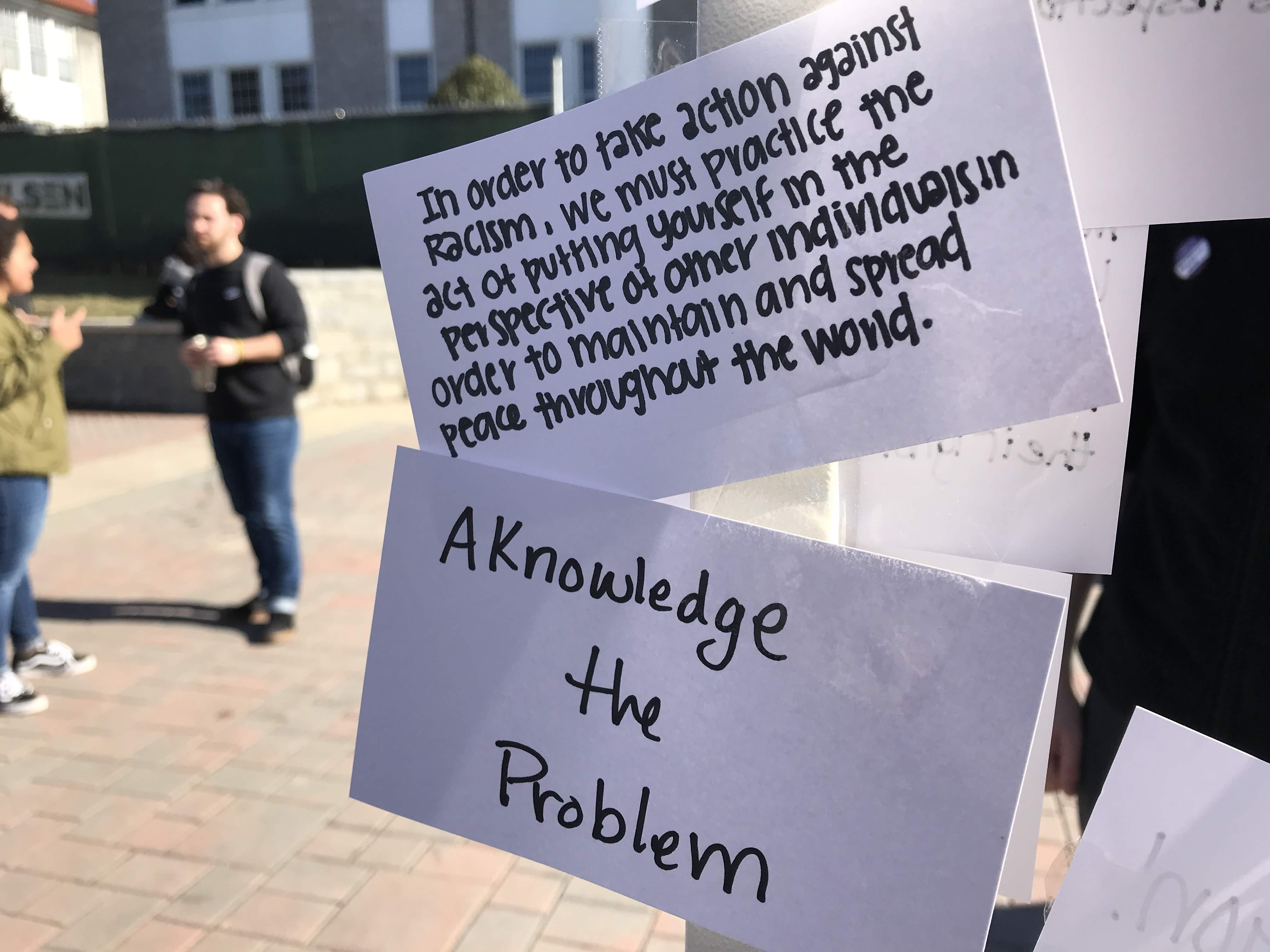Post by Anna Connole (JMU, ’20) and Shelby Taraba (JMU, ’18), Madison Center Engagement Fellow
 On a rare 60-degree February day in the ‘Burg, the Madison Center, Dukes Vote and Women of Color at JMU popped up our tents on the Quad and brought Benny’s pizza to start a conversation with about how we can address racism. The Tent Talk came just three days following revelations that Virginia Governor Ralph Northam had worn blackface. Although the racist actions in college of Governor Northam and Attorney General Mark Herring (revealed just days after) made the headlines, they are just symptoms of a deep history of racism and discrimination in Virginia and in institutions of higher education.
On a rare 60-degree February day in the ‘Burg, the Madison Center, Dukes Vote and Women of Color at JMU popped up our tents on the Quad and brought Benny’s pizza to start a conversation with about how we can address racism. The Tent Talk came just three days following revelations that Virginia Governor Ralph Northam had worn blackface. Although the racist actions in college of Governor Northam and Attorney General Mark Herring (revealed just days after) made the headlines, they are just symptoms of a deep history of racism and discrimination in Virginia and in institutions of higher education.
 To foster discussion, students, faculty and staff passing by our tents on the Quad were invited to fill out their response on index cards to the prompt: “My responsibility to dismantle racism looks like _____.” Student facilitators and Madison Center staff also asked students: “How can we hold people and institutions accountable for actions that are racist?” and “What is needed to change racist systems, cultures, and attitudes?” Quickly, flash cards lined the structure of the tent and discussions ensued.
To foster discussion, students, faculty and staff passing by our tents on the Quad were invited to fill out their response on index cards to the prompt: “My responsibility to dismantle racism looks like _____.” Student facilitators and Madison Center staff also asked students: “How can we hold people and institutions accountable for actions that are racist?” and “What is needed to change racist systems, cultures, and attitudes?” Quickly, flash cards lined the structure of the tent and discussions ensued.
Following the event, the Center compiled responses from the index cards to report how JMU students feel about racism and how we might address it. Answers ranged from the importance of acknowledging the problem, to furthering accountability of those who express racist intent. Many people noted the need for people to educate others and themselves, as well as accepting and exploring diversity of thought, appearance, and lived experience.
 Over 40% of responses honed in on accountability, with students writing: “Holding people accountable” and “calling them out” is needed to address racism. JMU students who stopped by our discussion, were overwhelmingly in agreement that many in positions of power have not faced consequences for their previous racist behaviors and actions.
Over 40% of responses honed in on accountability, with students writing: “Holding people accountable” and “calling them out” is needed to address racism. JMU students who stopped by our discussion, were overwhelmingly in agreement that many in positions of power have not faced consequences for their previous racist behaviors and actions.
 Recent revelations of the actions of Virginia officials showcase a history of racism that many think we’ve moved beyond. If anything, though, the revelations show how far as a country, our systems, institutions, and society at large still need to go to dismantle racism. An important goal of those participating in the Tent Talk was to highlight this fact. Racism is still prevalent in people’s day-to-day lives and not just at overt neo-nazi and white supremacist events. Standing under the Dukes Vote tents, student shared how their lived experiences with racism has impacted the extent to how safe and happy they feel in their communities. Some people were shocked to learn how prevalent racism remains, while others were not at all surprised.
Recent revelations of the actions of Virginia officials showcase a history of racism that many think we’ve moved beyond. If anything, though, the revelations show how far as a country, our systems, institutions, and society at large still need to go to dismantle racism. An important goal of those participating in the Tent Talk was to highlight this fact. Racism is still prevalent in people’s day-to-day lives and not just at overt neo-nazi and white supremacist events. Standing under the Dukes Vote tents, student shared how their lived experiences with racism has impacted the extent to how safe and happy they feel in their communities. Some people were shocked to learn how prevalent racism remains, while others were not at all surprised.
Gathered on the steps of Wilson Hall, students, faculty and JMU Scholar in Residence, Kevin Powell, discussed how racism is ingrained. We discussed the importance of education and open/honest communication that calls people in to intentional allyship. The importance of understanding intersectionality was also discussed because of how closely racism is related to homophobia, islamophobia, transphobia, white supremacy, and any other perspectives rooted in misinformation, hate, and fear.
[youtube https://www.youtube.com/watch?v=7WjsXY90uVc]
The key themes for this event, which were reiterated often, were the needs for: education, accountability, and continued communication.
 So here’s your call to action, whether it be out on the Quad, in your homes, in classrooms or over social media; the place isn’t important. Continued communication through open and honest conversations about racism and all the systems of our society it touches, is vital. It can not be ignored or pushed aside.
So here’s your call to action, whether it be out on the Quad, in your homes, in classrooms or over social media; the place isn’t important. Continued communication through open and honest conversations about racism and all the systems of our society it touches, is vital. It can not be ignored or pushed aside.
And let’s be clear, this is NOT a partisan issue. It’s about treating people the way anyone deserves to be treated, and dismantling the structures and systems that fail to serve everyone the same.
Recommended reading: “White Privilege: Unpacking the Invisible Backpack,” by Peggy McInstosh

Recent Comments